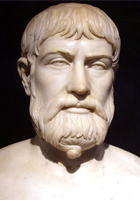Pindar
Pindar Poems
Among them too are the Muses
For everywhere
To flute and string the young girls
Are dancing,
...
Pindar Biography
Pindar (ca. 522–443 BC), was an Ancient Greek lyric poet. Of the canonical nine lyric poets of ancient Greece, Pindar is the one whose work is best preserved. Quintilian described him as "by far the greatest of the nine lyric poets, in virtue of his inspired magnificence, the beauty of his thoughts and figures, the rich exuberance of his language and matter, and his rolling flood of eloquence". However, not all the ancients shared Quintilian's enthusiasm. The Athenian comic playwright Eupolis is said to have remarked that the poems of Pindar "are already reduced to silence by the disinclination of the multitude for elegant learning". Pindar's 'elegant learning' has often discouraged modern interest as well, particularly up until the end of the nineteenth century. The discovery in 1896 of some poems by his rival Bacchylides then allowed for useful comparisons and it was found that some idiosyncrasies, evident in Pindar's Victory Odes, were typical of the genre rather than of the poet himself. From then on, the brilliance of Pindar's poetry began to be more widely appreciated by modern scholars and yet there are still peculiarities in his style that challenge the casual reader and he continues to be a largely unread, even if much admired poet. Pindar is the first Greek poet whose works reflect extensively on the nature of poetry and on the poet's role.Like other poets of the Archaic Age, he reveals a deep sense of the vicissitudes of life and yet, unlike them, he also articulates a passionate faith in what men can achieve by the grace of the gods, most famously expressed in his conclusion to one of his Victory Odes: Creatures of a day! What is a man? What is he not? A dream of a shadow Is our mortal being. But when there comes to men A gleam of splendour given of heaven, Then rests on them a light of glory And blessed are their days. (Pythian 8)
The Best Poem Of Pindar
The Hyperboreans From Pythian X
Among them too are the Muses
For everywhere
To flute and string the young girls
Are dancing,
In their hair the gold leaves of the bay:
The dance whirls them away:
Age or disease, no toil,
Battle or ill-day's luck
Can touch them, they
Are holy, they
Will outlast time, exempted
From the anger of the Goddess
And all decay.
Here the hero came
With the head
That shocked a royal house, turning
King and all into stone:
It was long long ago, if
Time means anything;
Long, long ago.
